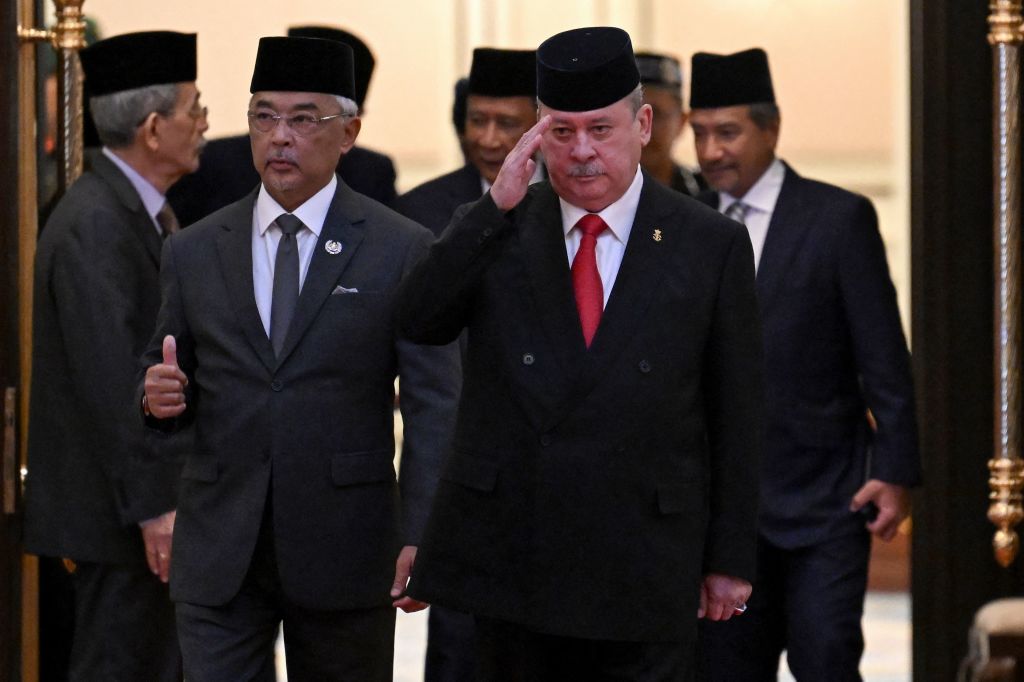
A new king will ascend to the throne in Malaysia, but no one died or was deposed to leave him in charge. Instead, as part of Malaysia’s unique, rotating monarchy, Sultan Ibrahim ibni Almarhum Sultan Iskandar, ruler of the southern Malaysian state of Johor, was “elected” by a council of state sovereigns on Friday.
The 64-year-old Sultan Ibrahim will replace incumbent sovereign Al-Sultan Abdullah ibni Sultan Ahmad Shah, who was crowned in 2019 and ends his term on January 30.
While Malaysia’s monarchy bears some similarities to that of its former British colonizers, since gaining independence in 1957, the country, which is governed via parliamentary democracy with the monarch holding a mostly ceremonial head-of-state role, has implemented a one-of-its-kind system of succession. Under the constitution, the monarch, called the Yang di-Pertuan Agong or Agong for short, is changed every five years. And the crown is not passed down by bloodline upon the previous monarch’s death or abdication, but rather it falls to the next in an established order of nine royal families who share the throne and are also the rulers of nine of the country’s 13 states. Even though the next in line is known, the monarch-to-be requires majority approval by the group of royals via a secret ballot.
Given the monarchy’s elevated status in Malaysia’s politics over the past few years, the newly-approved Sultan Ibrahim has “big shoes to fill,” says Muhamad Takiyuddin, associate professor of political science at University Kebangsaan Malaysia.
“In the current political atmosphere in Malaysia, we can be sure the monarchy [is] not only expected to play [an] important role as stabilizer but also as [an] important source of psychological relief for the people,” Takiyuddin tells TIME.
The monarchy’s increasing intervention
The Agong plays a largely ceremonial role in Malaysia’s federal constitutional monarchy, being the nation’s steward of its main religion, Islam. His powers are limited: the Agong acts upon advice by the Prime Minister or a cabinet official.
But the Agong signs off on laws and appointments to high-ranking state posts, and he is the Supreme Commander of Malaysia’s Armed Forces. He also has the power to grant pardons, reprieves, and respites.
In recent years, political crises in Malaysia have prompted the Agong to step in. The shock resignation of veteran parliamentarian Mahathir Mohamad from the premiership in 2020 prompted Al-Sultan Abdullah to speak to all 222 lawmakers before deciding on who will succeed Mahathir. He then appointed Muhyidin Yassin as Prime Minister. When Muhyiddin resigned amid lack of majority support 17 months later, the Agong repeated this process.
When the country’s general elections in November last year resulted in a historic hung parliament as major political coalitions could not cobble together a simple majority, the Agong intervened again and appointed Prime Minister Anwar Ibrahim. Sultan Muhammad V, Malaysia’s 15th Agong, had previously pardoned Anwar in 2018 after he was jailed since 2015 on sodomy charges.
What to know about Sultan Ibrahim
Born Nov. 22, 1958, Sultan Ibrahim is of Malay-British descent. His father is Sultan Iskandar ibni Almarhum Sultan Ismail, who led the state from 1981 until his death in 2010. His mother is Josephine Ruby Trevorrow, whom Sultan Iskandar met while he was studying in Britain. The two had four children, including Sultan Ibrahim.
The Johor royal is a fully trained army, navy, and air force officer, according to his coronation website. He studied at the Fletcher School of Law and Diplomacy in Boston.
Sultan Ibrahim is also involved in several businesses. Most notably, he has shares in a private company that has partnered up with embattled Chinese property developer Country Garden on the $100-billion Forest City project. The Forest City project, conceived in 2006, was envisioned as a smart city spanning four reclaimed islands off Johor, but financial difficulties saddling Country Garden has put the development of the estate on hold, putting into question whether the project will even be completed.
Unlike traditional Malaysian rulers, Sultan Ibrahim stands out for his candor. He has spoken against parliamentarians causing political instability in Malaysia, and openly shared his opinion on Malaysia’s relations with China, which he called a “good and reliable ally.” Sultan Ibrahim is also known for his religious moderation—in 2017, he ordered an alleged “Muslim-only” laundrette to apologize and to stop discriminating against non-Muslims or face closure.
Sultan Ibrahim enjoys close relations with Anwar, but Takiyuddin, the Malaysian political scientist, doesn’t believe the new monarch will “excessively” influence politics. “Sultan Ibrahim is known as a sultan who is quite independent,” he tells TIME. “He listens [to] the views of all parties.”
Correction, Oct. 29
The original version of this story misstated the king who pardoned Anwar in 2018. It was Sultan Muhammad V, not Al-Sultan Abdullah.
More Must-Reads from TIME
- Cybersecurity Experts Are Sounding the Alarm on DOGE
- Meet the 2025 Women of the Year
- The Harsh Truth About Disability Inclusion
- Why Do More Young Adults Have Cancer?
- Colman Domingo Leads With Radical Love
- How to Get Better at Doing Things Alone
- Michelle Zauner Stares Down the Darkness
Contact us at letters@time.com